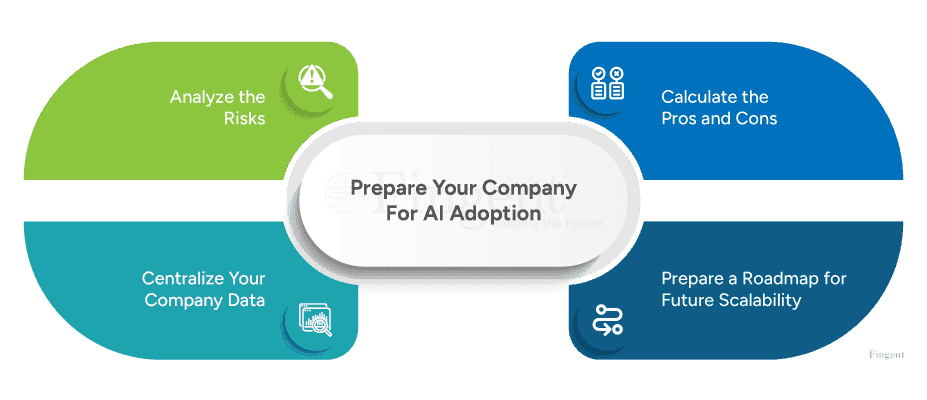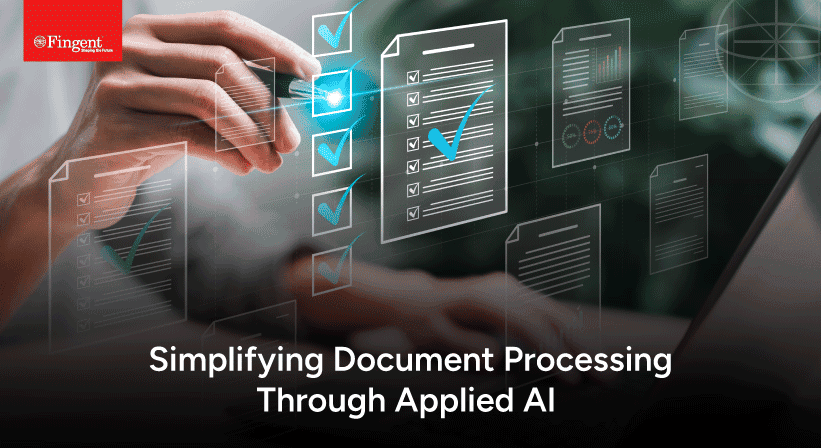AI in Business: Preparing Leaders For The Revolution
AI in Business is a present reality! It’s a building revolution that is all-encompassing and is redefining business operations. You have only two options. Either ride on the crest of this wave or get submerged if not prepared!
How can you become AI-ready? In this blog, we aim to clarify pertinent questions a business leader may have to achieve this goal successfully.
Why Do Business Leaders See AI as a Game-Changer?
A survey of around 2,000 executives, CFOs, and CEOs across 9 countries showed that “61 percent believe AI is a game changer for their industry, with the figure rising to 82 percent in the tech sector and 51 percent among automakers.”
They have a good reason for this, too. AI can bring phenomenal improvements in virtually every sphere of business. Automating tasks, improving forecasting, supporting intelligent decision-making, tightening compliance and security – AI does all this and more.
The future of business is intelligence. And those who prepare for the AI revolution today will lead the way tomorrow. Preparing for an AI revolution is much like training for a championship team. Even the best players can’t win without rigorous training, good planning, and top-tier equipment. Likewise, to stay ahead in the competitive market businesses need AI preparation. This will help you to harness cutting-edge tools, refine your strategies, and build a skilled team.
This could result in more intelligent business tactics and improved customer interactions. As leaders, you are undoubtedly enthusiastic about the potential cost savings. More importantly, consider how it can offer personalized services on a grander scale.
Don’t Stay Behind! Unlock Business Growth, Efficiency & Innovation With AI.
How Do I Know If My Company Is Ready for AI Adoption?
Adopting AI in business is transformative. It entails careful consideration and strategic planning. Here are some critical questions to help you assess your company’s readiness for AI adoption:
1. Is There a Genuine Need for Your Business to Have an AI Solution?
Arrange for a thorough analysis of your business processes. Does your business depend on large amounts of data? Are there many tasks that can be automated? Have there been security leaks or a risk of losing valuable business if there were? This analysis will help pinpoint areas where AI can provide tangible benefits and solve existing challenges.
2. Where Can Automation Take the Load Off?
AI’s most impactful applications include automation. Identify regular, repetitive activities in your company. Automating such tasks can enhance effectiveness and minimize the risk of human mistakes. This will enable your team to focus on innovation and more valued activities.
3. Are Your Employees and Stakeholders Ready to Adopt AI?
Successful AI implementation requires teamwork among your employees and stakeholders. Conduct a survey to assess the team’s willingness to adopt AI. Then, guide and support your team in understanding AI’s capabilities through training and resources. Engage stakeholders right from the planning phase. This action will guarantee that concerns are addressed and that you have their backing.
4. Do Your Customers Understand How You Use AI?
Ensure that your customers understand how AI is being used to enhance their experience. Help them experience the benefits. Building trust through transparency will foster customer acceptance of AI-driven innovations. Also, provides customers with options to interact with human representatives. This will help maintain a balance between automation and the personal touch.
5. Do You Have AI Expertise, Experience, and Talent?
Successfully integrating AI is not simple. It takes a combination of knowledge, skill, and expertise. Check if you have it. If you spot any deficiencies in AI knowledge and skills, think about hiring AI experts or teaming up with outside specialists. Create a strong AI team.
How to Prepare Your Company for AI Adoption?
Preparing your company for an AI in business strategy is crucial if you want it to succeed. Done right, it can bring unprecedented efficiencies and competitive advantages. If done wrong, the risks could cost you quite a pretty penny. So before you dive in headfirst, let’s talk about those annoying risks.

1. Analyze the Risks
- Ethical and Legal Risks: If you don’t want AI to cause unnecessary stress, follow ethical guidelines and legal standards. Identify and remove biases from your AI models.
- Security Risks: Cyber-attackers love AI systems. Analyze and beef up your cybersecurity to protect your precious data.
- Operational Risks: What can you do when you face workflow disruption? Plan ahead! Planning well in advance to address disruptions can keep things running smoothly.
- Financial Risks: True, AI isn’t cheap. Apportion funds to cover all those costs and then some.
- Workforce Impact: AI can change the nature of jobs. Prepare your workforce for these changes. Reskill, upskill, and repeat.
2. Calculate the Pros and Cons
As with everything, there are pros and cons to the application of AI in business. It’s better to be conversant with all its strengths and weaknesses. Here is how you can understand AI’s value versus potential drawbacks.
Pros:
- Increased Efficiency: Like a robot butler, AI applications in business take care of all the boring, repetitive tasks, allowing your employees to focus on strategic activities.
- Improved Decision-Making: Like a wise old sage, AI’s data analysis can dispense deeper insights for better decisions.
- Cost Savings: AI cuts operational costs and hikes profitability.
- Enhanced Customer Experience: AI in business personalizes interactions and turns customer service into a 5-star experience.
- Innovation Opportunities: AI innovation leads to a goldmine of new product ideas and market strategies.
Cons:
- Initial Investment: AI implementation can be costly at the beginning.
- Integration Challenges: Integrating AI with IT infrastructure can be complex and time-consuming.
- Skills Gap: If your organization lacks AI expertise, you will have to invest in training or hiring new talent.
- Dependence on Data Quality: AI relies on high-quality data. What goes in is what comes out. Poor data leads to inaccurate results.
- Ethical Concerns: AI raises ethical questions. Data privacy and bias in decision-making are the two main concerns.
3. Centralize Your Company Data
Data is the source of energy for AI systems. Effectively adopting AI depends on centralizing, organizing, and ensuring data accessibility. Here are some ways you can achieve that:
- Data Integration: Merge data from different sources into a centralized platform to ensure detailed AI analysis.
- Data Quality Management: Establish governance practices to guarantee data accuracy, completeness, and consistency. Also, regularly clean and update data.
- Data Security: This could include encryption, access controls, and regular audits.
- Scalable Data Infrastructure: If your data infrastructure is unable to handle large volumes, consider investing in cloud storage.
- Data Accessibility: Do your stakeholders have the required access to data? If not, implement user-friendly tools. This will facilitate easy data access and analysis.
4. Prepare a Roadmap for Future Scalability
A strategic roadmap is necessary for leading AI adoption and ensuring future scalability.
- Define Clear Objectives: Set distinct goals for AI initiatives. Then, align them with business strategy and address specific pain points.
- Pilot Projects: Start with small pilot projects to test AI feasibility and impact. Collect insights, fine-tune your approaches, and build confidence.
- Continuous Improvement: Regularly evaluate and enhance AI strategies and solutions. You can do this by using performance data and feedback.
- Stakeholder Engagement: Engage key stakeholders throughout the AI adoption process. Inform them about progress, challenges, and successes to ensure support.
- Resource Allocation: Ensure necessary resources. Budget for ongoing costs like maintenance, training, and upgrades.
- Training and Development: Invest in training programs to build AI expertise. Encourage continuous learning to stay updated with AI trends and technologies.
A Leader’s Blueprint For AI Success
How Can Fingent Help Me Streamline AI Adoption?
The application of AI in business is transformative but complex. At Fingent, we streamline this process seamlessly. We develop tailored AI strategies aligned with your business goals, conduct a thorough risk assessment and mitigation for ethical, legal, operational, financial, and cybersecurity risks, and ensure centralized data management and integration with scalable cloud solutions. Our custom artificial intelligence (AI) solutions integrate smoothly into your IT infrastructure, starting with pilot projects for validation.
Contact Fingent now to start your AI expedition!
Stay up to date on what's new

Recommended Posts

20 Jun 2024 Healthcare B2B
AI in Healthcare: Enhancing Patient Outcomes and Experience
Artificial Intelligence is a multi-talented assistant and has proven its worth in the healthcare industry. Healthcare organizations have found innumerable ways to use AI, from record maintenance to patient assistance.……

08 May 2024 Financial Services B2B
AI in Financial Services: Use Cases and Applications
Achieving perfection is no easy process. It is not impossible either. It takes a lot of effort and hard work but with the help of Artificial Intelligence, this process can……

24 Apr 2024 B2B
A Leader’s Blueprint for AI Success
How Are Businesses Using AI? The verdict is crystal clear—leaders today must embrace AI solutions to stay ahead of the curve and survive in the rapidly evolving business landscape. AI……

18 Apr 2024 B2B
Applied AI For Document Processing
"It's becoming increasingly clear that AI is the future, and almost everything else is a sideshow." - World-renowned computer scientist Geoff Hinton AI has taken over almost every aspect of……
Featured Blogs
Stay up to date on
what's new













